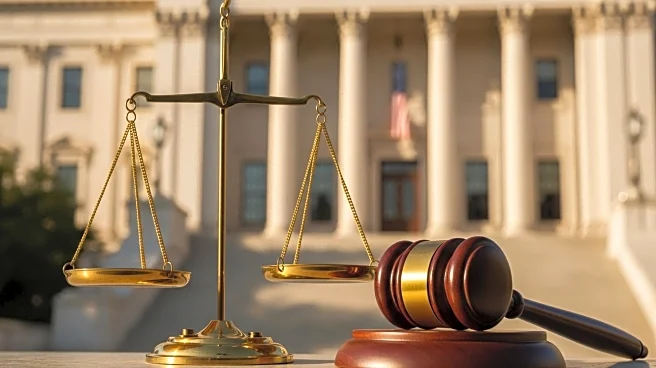What is the story about?
What's Happening?
The issue of flag burning as a form of protest has resurfaced in the United States, prompting discussions on free speech and constitutional rights. Historically, the Supreme Court has ruled in favor of protecting flag burning under the First Amendment, notably in the 1989 case involving Gregory Lee Johnson. Johnson was arrested for burning a flag during a protest against Reagan administration policies, but the Supreme Court ruled 5-4 in his favor, emphasizing the importance of free speech. Justice Antonin Scalia, a constitutional originalist, supported this decision, underscoring the First Amendment's role in protecting dissent against government actions. Recently, President Trump has called for charges against flag burners, arguing that such acts incite violence and unrest. This stance challenges the established legal precedent and raises questions about how current Supreme Court justices, many of whom have ties to the Federalist Society, will approach potential flag burning cases.
Why It's Important?
The debate over flag burning touches on fundamental issues of free speech and the limits of government authority. The Supreme Court's past rulings have set a precedent for protecting controversial forms of expression, reflecting the First Amendment's role in safeguarding dissent. President Trump's push to prosecute flag burners represents a significant challenge to this precedent, potentially impacting how free speech is interpreted and enforced in the U.S. If the courts were to uphold Trump's stance, it could lead to a narrowing of free speech protections, affecting activists and protestors across the nation. Conversely, reaffirming the protection of flag burning would reinforce the judiciary's commitment to upholding constitutional rights, regardless of political pressures.
What's Next?
The potential for new flag burning cases to reach the Supreme Court could test the resolve of current justices to uphold established free speech protections. With President Trump's influence and the Federalist Society's impact on judicial appointments, the court's decisions could shape the future of First Amendment rights. Legal experts and civil rights advocates are likely to closely monitor any developments, as these rulings could have far-reaching implications for protest rights and government accountability. The outcome may also influence public discourse on the balance between national symbols and individual freedoms.
Beyond the Headlines
The flag burning debate highlights broader cultural and ethical questions about patriotism, dissent, and the role of symbols in society. It raises issues about how national identity is expressed and contested, and the extent to which government can regulate symbolic acts. The discussion also reflects ongoing tensions between conservative and liberal interpretations of the Constitution, with implications for how American values are defined and defended.















